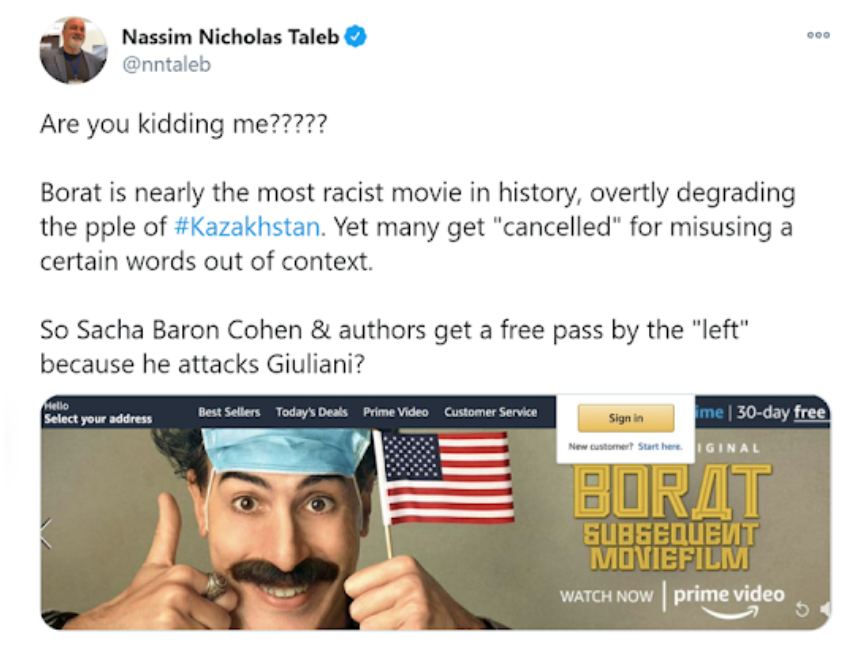With the Borat sequel out on Amazon, Americans can celebrate elections with some more hyperrealism to feed their selective wokeness with. The racist, highly unethical, ignorant and hypocritical parody makes a return to the homes of befittingly bigoted fans.
The people, ordinary Americans who are so attached to Borat, are of course not at fault even though it may seem. But why is there even a sequel in the first place? The first movie was a box office success, making $262.2 million. Ergo, what makes dough must be irresistibly funny, a cultural icon even, to make people yearn for more. And what’s that in this day and age? We’ve already moved past despicable racist humour of the 1960s Hollywood era, where we allow Western audiences to crack a joke at the xenophobic portrayal of black people and East Asians. Indeed, the West has grown beyond such abhorrence. Instead, in this all-embracing year of 2020, Hollywood makes a xenophobic portrayal of unknown countries – a terra incognita for white Westerners not to feel so bad about their closeted racism.
Background
Kazakhstan is a country in Central Asia and a former member of the Soviet Union. Main languages? Kazakh and Russian. Religion? A mix of a bit of everything; aka secular. Politics? Broken and rigged; aka a dictatorial regime spanning over thirty years. Society? Repressed, in search of a better future.
Kazakhstan faces the same political and socio-economic problems as any country just with more human rights violations and less global media coverage. Among these issues are the imprisonment of political activists, lack of environmental awareness and outdated higher education. With that said, Kazakhstan’s culture and history is rich and complex, and worth the recent protests and general dissatisfaction with the authoritarian government. People continue to fight for justice and a country they deserve at the risk of their own and their families’ lives.
So it really shouldn’t come as a surprise why the people, fed up with the realities of their everyday lives, would be a little bit offended at a movie that adds fuel to the fire.
Now, what’s really going on?
So why, Kazakhstan? The mastermind behind Borat and the lead actor, Sacha Baron Cohen, has repeatedly stated in his interviews that the movie is a satirical representation of how Americans think the ‘rest of the world’ is. After all, the movie centres around the actor dressed up as Borat going around interviewing deep-south Americans, revealing their shameful bigotry. Baron Cohen ‘chose Kazakhstan because it was a place that almost nobody in the U.S. knew anything about, which allowed us to create a wild, comedic, fake world.’
Well, I guess the end goal was reached: make money off ridiculing ignorant Americans by using a foreign country that no one knows about. But what a surprise, the ignorant Americans (and not only Americans!) now believe Kazakhstan is the world’s ditch to fill their suppressed racist energy with. Not only is the image of Kazakhstan irreversibly tarnished, Kazakhstan nationals all over the world (myself included) once again find themselves in a renewed state of forced shame and self-consciousness.
Borat made a whole campaign, creating a fake page of the Republic of Kazakhstan and using its national emblem. The film was shot in Romania, which reveals what was going on in producers’ heads. In particular, who cares? Two former Soviet countries, is there a difference?
It is interesting how the supposedly ‘woke’ white American audience can take offence at a word taken out of context but will unapologetically and openly make fun of a real country, with real people but of a different race and culture. A more disturbing hypocritical detail here is that Kazakhstan has never been under a colonial rule by the West. In other words, you are immune to racist caricatures and parodies if you come from a colonial background or a country with active American military bases. The rationale here is, if you tick off the following– your people have suffered enough, and the civil rights movement has insured you in the 1970s – you will not be made fun of. So where can an entitled audience pour their bottled racist energy into? That’s right, a country that has existed unbeknownst to the ‘civilised’ world.
Not to mention how highly unethical the movie is. One of the scandals caused by Borat was the scene with Rudy Giuliani and Borat’s fictional underage daughter, where Giuliani is exposed reaching into his trousers in front of the actress while alone with her in a hotel room. Obviously, that was another blow to Giuliani’s contentious reputation. Nobody, however, questioned the fact that the actress was forced to go into a room alone with Giuliani, offering him a drink according to the script.
Alternatively, a different scene where Borat goes to a small village in Romania, portraying a local car mechanic as an abortion doctor. The villagers were essentially being paid and lied to to get them on camera, completely unaware of what is happening. So in the end, Borat does not aim at the clueless Americans to illustrate their deep-rooted issues. Instead, it raises more issues for the ‘fake world’ it so carelessly depicts.
The response?
No research or surveys are needed to measure the discontent with Borat. The reason why we don’t hear much about the opinions of real Kazakhstanis is that fundamental rights such as freedom of speech and expression apparently apply only to the part of the world in charge of main media outlets and entertainment channels. Those who disagree do not have the platform to voice their disagreement.
What about victim-blaming? That, in fact, applies. If you so even as try to point out the selective racism and hypocrisy that went into making this movie, you will be shamed and bullied into thinking you are taking it ‘too seriously’.
Let’s clarify something about humour. I will squeeze out a laugh at the ‘witty’ jokes, my wife-intonated accent, and a whole pack of things people still find hilarious. What I refuse to shrug off with laughs is what this movie has brought back into my and other Kazakhstanis’ lives: good old casual racism.
Being an international student my whole conscious life, it would be understated to say that I have encountered racism. Most of the remarks came from white, educated people (teachers, for example) and fellow British/American students. For a twelve-year-old uninhibited child, Borat comments opened my eyes to a very dark and very real world where opinions about you have already been made based on something so innocent as a movie. And if you ever come across a young person from Kazakhstan, don’t be afraid to ask them what they think about Borat. They will gladly share their past trauma with you.
I will not pretend not to take offence to keep peace. I am, quite frankly, tired of trying to diffuse the situation by pulling a smile in an I-am-fine-it’s-really-nothing manner to show that I ‘can take a joke’. Then learn to take a joke, some (or most) of the people will say. But here’s the problem. If you can make a joke out of a whole country– and by you, I mean everyone involved in making Borat a cultural phenomenon that it is today – I can at least spit back at you with disgust and some enlightening reasons as to why I am not amused.
Takeaway
At a time when Kazakhstan is so desperately trying to figure out its identity, it seems our identity has already been defined for us. With all the political turmoil, the civil struggle for justice and a grapple for more than survival-level standards of life going on in the real Kazakhstan, ‘Borat 2’ is just what we needed. A cherry on top of a pile of silenced voices, rigged elections and outcries for change.
While Borat serves to unearth the not so deep fascist sentiments of American conservatives, what is confirmed for the rest of us is that not only is it the ‘uneducated conservatives’ whose xenophobia has been brought to light but anyone who hails ‘Borat’ as a pinnacle of humour. It is not an ‘us vs them’ mentality we must fight against. It is ‘us over them’, whereby a highly ‘developed and progressive’ society can easily add an unimportant, unknown low society to their racist piggy bank.
Here’s a quick test to wrap up. You find ‘Borat’ and Sacha Baron Cohen unbelievably and utterly hilarious, and see absolutely no problem with it? Congratulations, you are an ignorant bigot and a hypocrite. Bonus points if you go about explaining how deep and satirical the movie actually is, advising others to ‘learn to take a joke’.
Some thoughts on Borat 2:







